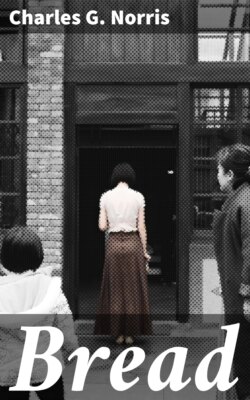Читать книгу Bread - Charles G. Norris - Страница 12
На сайте Литреса книга снята с продажи.
CHAPTER II § 1
ОглавлениеIt took all Jeannette’s young vigorous determination to carry into effect the plan she had conceived the night of the Armenian dance. She met with an unexpected degree of opposition from her mother, and even from Alice, who was as a rule indecisive, and the vaguest of persons in expressing opinions. It was too grave a step; Janny might come to regret it bitterly some day, and it might be too late then to go back; Alice thought perhaps it would be wiser to wait awhile. But Jeannette did not want to wait. The more she thought about being a wage-earner, and her own mistress, free to do as she pleased and spend her money as she chose, the more eager she was to be done with school and the supervision of teachers. She felt suddenly grown up, and looked enviously at the young women she met hurrying to the elevated station at Ninety-third Street in the early mornings on their way downtown to business. She noted how they dressed and critically observed those who carried their lunches. She thought about what she should wear, the kind of hat and shoes she would select, when she was one of them. If it meant skipping her noonday meal entirely, she decided, she would never be guilty of carrying lunch with her. Alice and her intimates at school on a sudden became drearily young to her; she was irritated by their giggling silliness. She chose to treat them all with a certain aloofness, and began to regard herself already as a highly-paid, valued secretary of the president of a large corporation. In the evenings she found excuses for visiting Rosa Najarian and eagerly listened to the older girl’s account of the business routine of her days.
The tuition at the Gerard Commercial School for ten weeks’ instruction in shorthand and typing was fifty dollars payable in advance, and it was her inability to get this sum that prevented Jeannette from putting her plan immediately into effect. She made herself unhappy and her mother and sister unhappy by worrying about it. Mrs. Sturgis fretted uncomfortably. She alone was aware of an easy way by which the money could be obtained, but since she did not approve of her daughter’s purpose, she had no inclination to divulge it.
A five thousand dollar paid-up insurance policy from a benevolent society had become hers at the time of her husband’s death. It represented a nest-egg, the thought of which had always been the greatest comfort to her. In sickness or in case of her death, the girls would have something; they would not be left absolutely destitute. She had never mentioned this policy to her daughters, always being afraid she might borrow on it, and many a time she had been sorely tempted to do so. With the knowledge of its existence unshared with anyone, Mrs. Sturgis felt herself equal to temptation; but once taking her children into her confidence, she feared she would soon weakly make inroads upon it.
Now as Jeannette became restive and impatient for want of fifty dollars, her mother grew correspondingly depressed. It was to protect herself against just such wild-goose schemes as this, she told herself over and over, that she had refrained from telling her darlings anything about the money.
But events, unforeseen, and from her point of view, calamitous, robbed her of her fortitude, and forced her to play into her daughter’s hands. Scarlet fever broke out in the neighborhood; an epidemic swept the upper West Side; the Wednesday and Saturday lessons,—all of them,—had to be discontinued; Miss Loughborough’s school closed its doors. Mrs. Sturgis found some music to copy, but the money she earned in this way was far short of the meager income upon which she and her daughters had depended. The days stretched into weeks and still new cases were reported in the district. The time came when there was actual want in the little household, literally no money with which to buy food, and no further credit to be had among the tradespeople.
Jeannette applied for and secured the promise of a job in a small upholsterer’s shop in the neighborhood at six dollars a week, and in the face of her firm resolution to accept the offer and go to work on the following Monday morning, Mrs. Sturgis confessed her secret. As she had foreseen, Jeannette had little difficulty in persuading her,—since now she would be compelled to borrow on her store,—to make the amount of her loan fifty dollars additional.
“Why, Mama, I’ll be earning that much a month in ten weeks, and I can pay it back to you in no time.”
“I know—I know, dearie. But I just hate to do it.”
Eventually, she gave way before her daughter’s flood of arguments. It was what she had feared ever since Ralph died; there would be no stopping now the inroads upon her little capital; she saw the beginning of the end.
But Jeannette went triumphantly to school.
